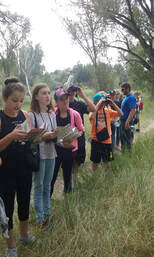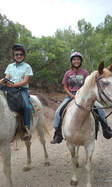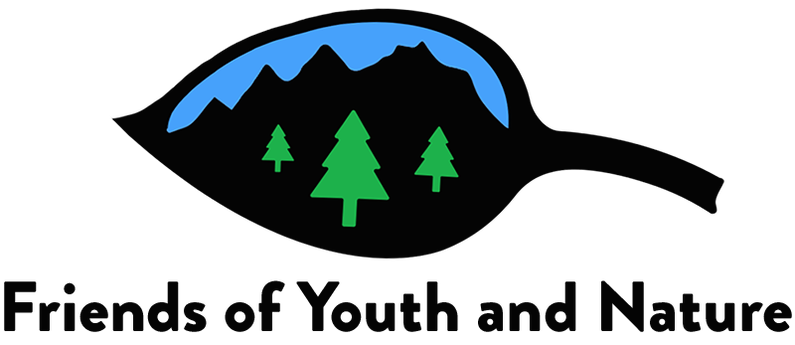|
Tips to help you connect your family to nature!
|
We are so lucky to live in Colorado, where there is such a wide variety of outdoor opportunities for youth close to home in local state parks and in our vast open landscapes across the state. This past week, the Colorado Equity Grant Board awarded various Colorado nonprofits a total of $1.3 million to help more kids and families experience the outdoors. Here on the Western Slope, Friends of Youth and Nature was awarded a generous grant of $67,180 towards our efforts in getting local youth into outdoor activities. This gift to our citizens is an effort to increase access to the outdoors for our youth and instill stewardship practices of our state's outstanding natural resources in the next generation. In the long run, this investment will increase the health of Coloradans and our communities. The personal benefits gained from outdoor experiences is not a novel concept; there is a plethora of research proving that outdoor activities overall increase individual well-being.
According to Dr. Constance Scharff in Psychology Today, “Children are increasingly spending time indoors engaged with various forms of electronic devices: phones, computers, tablets, televisions, and gaming consoles. There is significant data indicating that time spent outdoors, whether in play, outdoor education or recreation, or even gardening, can have a real and positive impact on mental and physical well-being.” Author Dr. John J. Ratey in his book, The Revolutionary New Science of Exercise and the Brain, discusses how exercise influences the brain on a cellular level. He also talks about how lack of real play does hurt children because they need to use their imaginations to develop creative thinking and problem solving skills. Many outdoor activities require kids to work together and communicate in order for everyone to have fun or to accomplish a common goal. He also describes a bacterium in the soil that increases serotonin in the brain and improves mood. Who knew that getting dirty is a good thing! There are many activities to do outdoors, including hiking, camping, rafting, paddle boarding, rock climbing, skiing, sledding, orienteering, horseback riding, and raising animals, just to name a few. Some examples of activities and research-proven benefits include: Gardening – Teaches patience, perseverance and empathy (and don’t forget that special bacterium that increases serotonin levels). According to Dr. Scharff, gardening teaches children about the food cycle and nutrition, provides important life skills, and creates opportunities for children to learn competence, resilience, and community building. There are Junior Master Gardener programs that can be integrated into school curricula or used at home or with youth groups. Children’s gardening programs ignite a passion for good food, provide opportunities for people of all ages to work together, and develop important life skills that can lead to a lifetime of healthy choices. Food produced may be used in home or school settings, or canned for use in the off-season, and the excess can be donated to local food banks. Walking and talking − Builds conversation skills and helps with the flow of creative thinking. Just taking a long walk outdoors with a friend has many benefits. State and national parks offer a wide variety of outdoor activities for youth and families. These are not necessarily just hikes or camping, but interactive wildlife activities, archaeological explorations, storytelling times, and much more. The park service often coordinates activities and provides special programming for youth groups. Every Kid in a Park is a National Park Service Program to encourage youth visitation to national parks. Every Fourth grader gets a yearlong free family pass to any national park. Visit their website to find out more, and encourage your kids to become junior rangers (www.nps.gov/kids/every-kid-outdoors.htm). Public lands managed by the U.S. Forest Service and Bureau of Land Management have mostly free access with a variety of trails for mountain biking, hiking, cross country skiing and snowshoeing. Bird Watching − Watching any wildlife has its benefits! Observation can help build attention skills while also practicing mindfulness and coping strategies. It also stirs a sense of curiosity in young people. Many birding organizations provide activities and/or mentors to teach children about bird watching. Check into your local Audubon chapter, Colorado Field Ornithologist groups, or the Bird Conservancy of the Rockies. National and state parks also offer nature programs that are scheduled or can be requested by contacting them. Audubon Adventure for Kids highlights curriculum and related DIY activities that can be done at home or in a yard or park (www.audubon.org/get-outside/activities/audubon-for-kids). Scavenger hunts are a great way to get kids excited about exploring nature and improve their observation and attention skills. Looking for a bird nest, a cactus flower, a cool rock, or an animal track can be very exciting. Search the internet for nature/outdoor scavenger hunts; you will be surprised with how many come up. Horses − Studies have shown that working with horses helps children, teens, and adults make significant improvements in the areas of confidence, anger management, empathy, impulse control, self-esteem, PTSD, anxiety, and overall emotional well-being. Did you know that horses can be an emotional mirror to ourselves? Research has also shown that horses recognize and react to human emotions from our body language and facial expressions. Since they are herd and prey animals, they have a strong emotional sense, reflect and respond to the behavior of other horses in the herd. Even playing with your family pet or walking your beloved dog has huge benefits. Speaking of the influence animals have on youth, Meet Wilder! This is a very engaging video you can watch with your kids featuring Wilder. It will inspire them to go outdoors and play (www.generationwild.com/). Are you looking for something that will help your child build social interaction skills, confidence, problem solving skills, independence, creativity, and emotional well-being? Take them outside! No matter what activity they do outdoors, just getting them outside on a regular basis has so many benefits to them, their families, and our communities.
0 Comments
|
Blogs for Summer! DIY Summer Camps A Summer backyard Bucket List Hiking with Children 101 Kids, Dogs and Hikes a Winning Combination Getting Outdoors is Easier than You Think Categories
All
Archive
Archives
July 2024
|




 RSS Feed
RSS Feed


